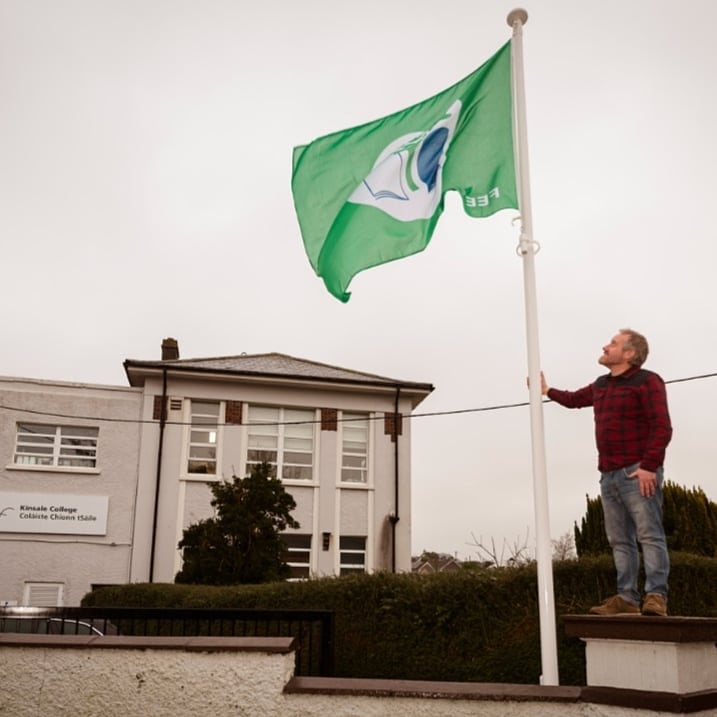Green Campus
Take the first step!

Kinsale Campus became the first Campus of Further Education in Munster to achieve the An Taisce Green Campus Award.
Winning the prestigious green flag is the latest in Kinsale Campus’s impressive list of environmental awareness credentials. It was the first college in the world to offer a course in permaculture back in 2001. Ever since then, Kinsale Campus has been gaining national and international recognition as a climate action hub.
Previous Campus director Liz Moynihan paid tribute to the hardworking staff and students who collaborated to achieve the Green Campus designation: ‘We’re delighted to get this national recognition, and it’s well-deserved,’ she said.
‘Lots of schools and colleges have implemented green policies to teach our young people what it takes to tackle climate change. But, here in Kinsale Campus, we’re a step ahead because we have climate activists on our campus every day of the week, our permaculture students.
They’re leading the march on climate change in the Kinsale area – for example, they’ve been working on an energy audit and energy management plan for the whole eircode P17 district. They are working towards greater biodiversity in the area, encouraging more bees, birds, butterflies and native wildlife by reducing the use of herbicides and other poisons in managing our natural environment.’
The Green Campus Award doesn’t just focus on building awareness of environmental issues among students and staff at the campus to ensure the carbon footprint of each staff member and student is reduced. Andrew Brownlee, chief executive of Solas, took to twitter to congratulate Kinsale Campus and added that Green campus is one of the core pillars of the vision for the further education and training college of the future set out in Solas FET strategy and added how fantastic it was to see Kinsale Campus blazing a trail.
Sustainable horticulture students here have been very pro-active over the years about going out into the community and teaching other people how to treat our planet with more care. They’ve even designed gardens for local schools and, as soon as restrictions are lifted, that’s the work they want to do more of – getting the message of environmental awareness out to the wider community.
Promoting Biodiversity onsite is our main theme alongside reducing waste levels, energy and water use in the college. Bat boxes, bird tables, bee & butterfly meadows alongside planting native trees and shrubs and a strong emphasis on producing local organic food onsite helps us achieve our main theme of helping improve biodiversity onsite.
Green Charter – Biodiversity Policy:
- To protect the biodiversity, we have onsite by using organic methods to manage the grounds and by allowing areas to go wild or minimal management to allow animals and plants and other organisms to complete their lifecycle unhindered and undisturbed.
- To increase biodiversity onsite by increasing the diversity of species, niches and habitats.
- To protect our soil by using organic methods and reducing open grass cover onsite.
- To educate all who enter Kinsale Campus about the world’s most important gift which is our living ecosystem and all the life contained therein.
- To link food production with biodiversity issues and educating staff and students on the sustainability links between the two and continue the tradition of local food production and culinary skills in Kinsale.
Litter & Waste:
- To reduce litter and reduce the waste generated in the campus.
- To reduce waste going to landfill by diverting more waste to recycling and to compost all the organic matter onsite.
- To highlight that recycling is not the best solution to waste management and to encourage a Zero Waste approach to our daily lives which is rooted in Permaculture principles that have existed since the 1970’s and on the course which has been taught here since 2001.
Energy:
- To continue to reduce energy use in the college and investigate efficiencies across the campus.
- To generate our own green electricity.
- To highlight the hidden areas where energy is used that people are unaware of such as Data centres and fast fashion.
